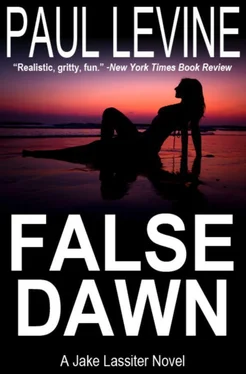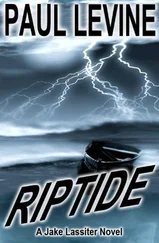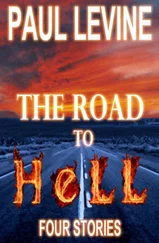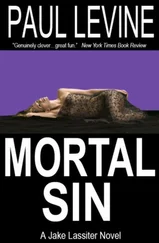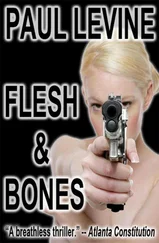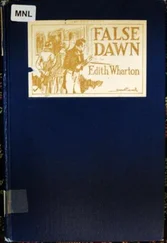Paul Levine - False Dawn
Здесь есть возможность читать онлайн «Paul Levine - False Dawn» весь текст электронной книги совершенно бесплатно (целиком полную версию без сокращений). В некоторых случаях можно слушать аудио, скачать через торрент в формате fb2 и присутствует краткое содержание. Жанр: Криминальный детектив, на английском языке. Описание произведения, (предисловие) а так же отзывы посетителей доступны на портале библиотеки ЛибКат.
- Название:False Dawn
- Автор:
- Жанр:
- Год:неизвестен
- ISBN:нет данных
- Рейтинг книги:3 / 5. Голосов: 1
-
Избранное:Добавить в избранное
- Отзывы:
-
Ваша оценка:
- 60
- 1
- 2
- 3
- 4
- 5
False Dawn: краткое содержание, описание и аннотация
Предлагаем к чтению аннотацию, описание, краткое содержание или предисловие (зависит от того, что написал сам автор книги «False Dawn»). Если вы не нашли необходимую информацию о книге — напишите в комментариях, мы постараемся отыскать её.
False Dawn — читать онлайн бесплатно полную книгу (весь текст) целиком
Ниже представлен текст книги, разбитый по страницам. Система сохранения места последней прочитанной страницы, позволяет с удобством читать онлайн бесплатно книгу «False Dawn», без необходимости каждый раз заново искать на чём Вы остановились. Поставьте закладку, и сможете в любой момент перейти на страницу, на которой закончили чтение.
Интервал:
Закладка:
Had Foley really said ten million?
The taxi pulled into a large square dominated by a huge obelisk. “The Plaza de la Revolucion,” Soto told me. “Formerly, Plaza Ci’vica.”
“Folks do a lot of name changing around here,” I said. “Maybe after Castro’s gone, they’ll change it all back. Like Leningrad to St. Petersburg. How about a Parque Soto in Old Havana?”
“I never had such ambitions. It is enough for me to be a lieutenant in the eternal war for justice. “
He stared at the monument, and something nagged at the back of my mind. What was it?
Present tense.
It is enough for me…
Soto was still a soldier. “What war?” I asked.
“Do you know nothing of history, the struggle against neocolonialism, fascism, and racism?”
“That sounds like Castro’s rhetoric.”
“Rhetoric? Is that what you call it?”
“What now, are you going to defend the guy who put you in prison and threw away the key?”
“I don’t condone his Stalinist repression of dissent, but I have never disagreed with his philosophy or principles. Have you ever listened to even one of his speeches to the Movement of Nonaligned Nations?”
“No, I seldom have six hours to kill.”
“His are the words of a giant who has prevailed against the concerted efforts of eight American presidents to overthrow him. Fidel has been shaped by Cuba’s tragic past, four hundred years of domination by the Spanish, fifty years by the Yankees.”
“And now thirty years of glorious independence.”
He looked toward a statue of the Cuban poet Jose Marti at the base of the spire. “You are being sarcastic, are you not?”
“Yeah, in case you haven’t heard, Marxism is dead, but here you are, the number-one fan of the All-Pro commie dictator.”
“I told you I can see Fidel’s faults, but-”
“But he’s the lesser of two evils, right?”
“ Si, compared to the imperialists-both American and Russian-Fidel is a santo, a saint. He believes in Cuba for Cubans, an independent country free of control by outsiders.”
“I don’t believe this. All this time, I thought you wanted to overthrow Castro.”
“My philosophy has been consistent for thirty-five years. Am I not entitled to my beliefs, my freedom of expression you Yankees always speak about?”
But where does philosophy end and action begin, I wondered.
Soto motioned for the driver to get moving. “We were the children of the centenary, Fidel Castro Ruz and I. In 1953-the one hundredth birthday of Jose Marti-we attacked the Moncada fortress in Santiago de Cuba. You should have seen Fidel then. Rugged, clear-eyed, full of purpose. Did you know he was a lawyer?”
Just like Gorby and little old me. I wondered if the clear-eyed bearded one ever defended a condom-in-the-salad case.
“The attack failed,” Soto said, “and we were both arrested. At the trial, Fidel gave a brilliant speech. He told the world, ‘History will absolve me.’” Soto pulled a Partagas from his guayabera pocket. He rolled the cigar under his nose but made no move to light it. “We were both imprisoned on Isla de Pinos, then exiled to Mexico. But we never gave up. We planned for a Cuba where every child could read and write and have doctors and nurses provided by the state, where we would get fair prices for the sugar and fair wages for the workers. We would burn the casinos and send the whore-mongering Yankees home. Eventually we sailed from Tuxpan on the Granma with eighty-two men. Eighty-two men to fight a war! Do you know what Castro said as the lines were cast off and we headed toward what I believed was certain death?”
“‘Who brought the Dramamine’?”
Soto’s eyes were thirty-five years and hundreds of miles away. “‘If I set off, I arrive; if I arrive, I enter; if I enter, I win.’”
“And he won.”
“ We won! Not that it was easy. Camping in the Sierra Maestra mountains, recruiting villagers for the rebel army. Fighting and running and fighting again until Batista fled like the coward he was, and eight days later, we rode triumphantly into Havana.”
“And one dictatorship was replaced with another.”
He shot me a look. “But the children can read, and there are doctors for all.”
“And Mussolini made the trains run on time.”
“Perhaps we should not speak of politics,” Severo Soto said, striking a match to his cigar, then puffing at it until an orange spark glowed at the tip. He exhaled a wisp of smoke toward the monument, and without turning to me said, “It is beautiful to behold, is it not?”
“What, the statue?”
“The art. You saw it, all gathered together.”
I thought of the warehouse, the paintings and sculptures, the coins and jewels, the intricate eggs and ancient artifacts, the treasures of long-dead nobles and czars. I thought of the golden bunny in Crespo’s clenched fist. “Yes, I have seen it all.”
Soto’s eyes glistened. “It is beautiful, is it not?”
“It’s the stuff dreams are made of,” I said.
S urrounded by Canadian yachts and luxury craft from South America, the rusty Polish freighter creaked against its lines and rested low in the water, its paint faded, an unlikely bearer of a priceless treasure. Maybe that was the idea. The Polonez was moored at Hemingway Marina, which sits on the shoreline of the Great Blue River, as Ernest Hemingway called the Gulf of Mexico. According to a sign near an outdoor restaurant, the writer started a marlin fishing tournament here in 1950.
Soto and I followed Foley down a ladder. The freighter smelled of diesel fuel and stale air. Foley turned the wheel on a watertight hatch. We stepped over a metal rise and into the hold. Ten metal containers the size of trailer-trucks lined the bulkhead, five on each side. We sat at a wooden table bolted to the deck. A crewman brought us a pot of cafe Cubano, then left, sealing the door behind him.
“Hey, Soto, you’ll be a big hero back at the Farm,” Foley said. “You’ll get a gold watch.”
Severo Soto’s dark eyes flared. “You are a man without principles. You are a servant to expediency.”
“Wrong, my friend. In the end, I’m loyal to my country, as you are to yours. I just gauge the way the wind is blowing and try to make a buck out of it.” Turning to me, Foley said, “Or two hundred million bucks, eh, Lassiter?”
“I’m going to drink my coffee and let you boys play your macho spy games,” I said. “When you’re done wagging your dicks, let me know, and we’ll talk about the logistics for getting this old tug into the Gulf Stream.”
Soto looked toward the steel containers. “Perhaps it is not too late for the wind to shift. What makes you think Fidel will let you take the art now that it is here?”
Foley laughed like a man holding four aces. “What’s he going to do with the stuff, sell it at Sotheby’s? Become an international fence? He can’t take the heat. He’d lose the moral high ground. The few friends he has left would scorn him. The Russians would write him off if they haven’t already. The Chinese would stop sending bicycles, then where would he be, buying roller skates from the North Koreans for his great revolution?”
“And what if we just took the ship away from you?” Soto asked, his voice even and soft.
We? At first I thought that included me. Then I realized we referred to his old muchacho Fidel.
“Why would you do that?” Foley asked. “The Company’s making a deal for pocket change. The Russians get their art, and everybody goes home happy.”
“I will not be happy,” Soto said, his voice still betraying no emotion, “and I will not be home.”
Foley smiled. The look was familiar. Did it come just before or after he broke Kharchenko’s finger? “Hey, Lassiter, you said we had a deal. Now this old geezer’s changing the terms, holding me up for a piece of the action.”
Читать дальшеИнтервал:
Закладка:
Похожие книги на «False Dawn»
Представляем Вашему вниманию похожие книги на «False Dawn» списком для выбора. Мы отобрали схожую по названию и смыслу литературу в надежде предоставить читателям больше вариантов отыскать новые, интересные, ещё непрочитанные произведения.
Обсуждение, отзывы о книге «False Dawn» и просто собственные мнения читателей. Оставьте ваши комментарии, напишите, что Вы думаете о произведении, его смысле или главных героях. Укажите что конкретно понравилось, а что нет, и почему Вы так считаете.
